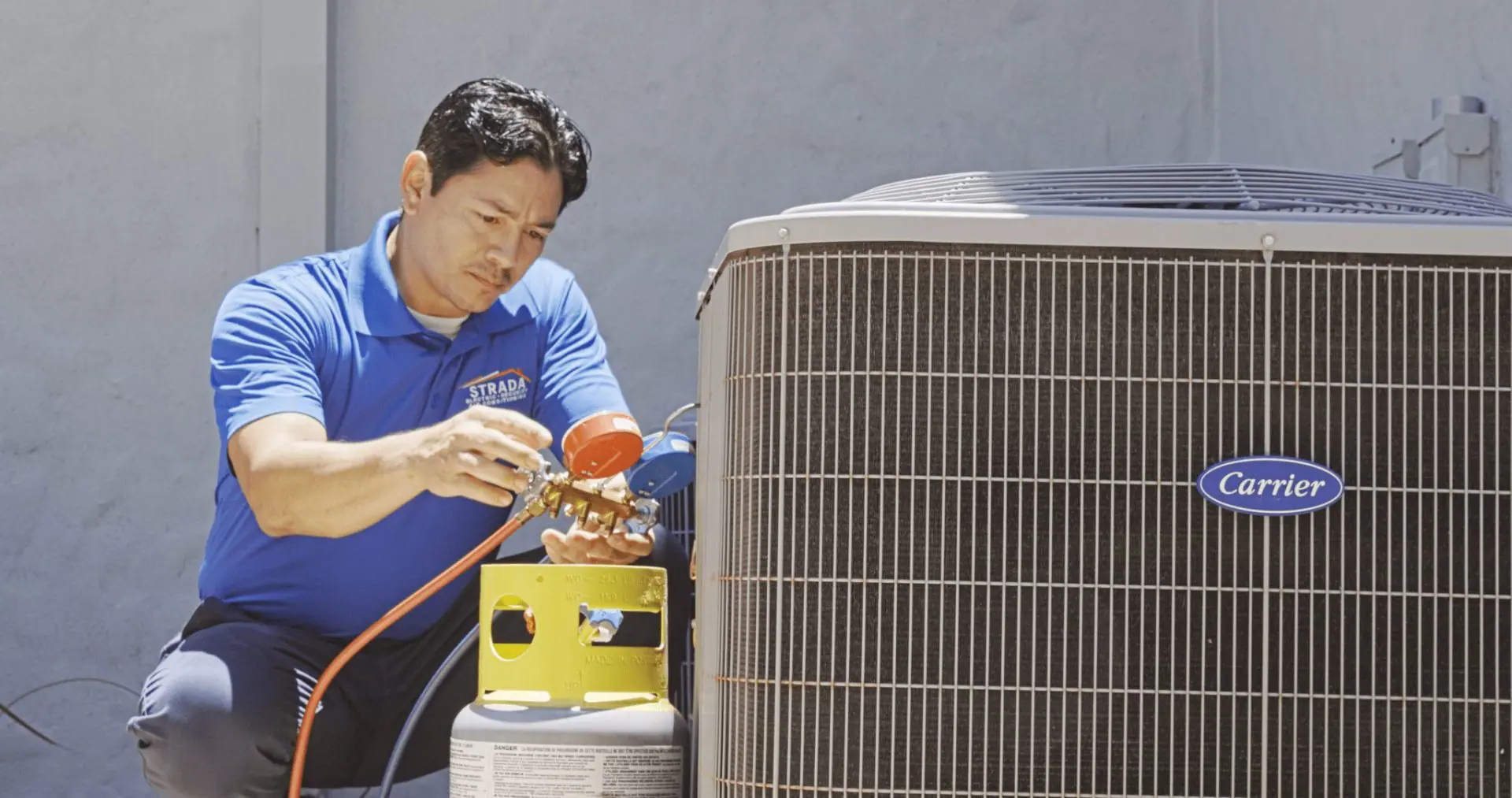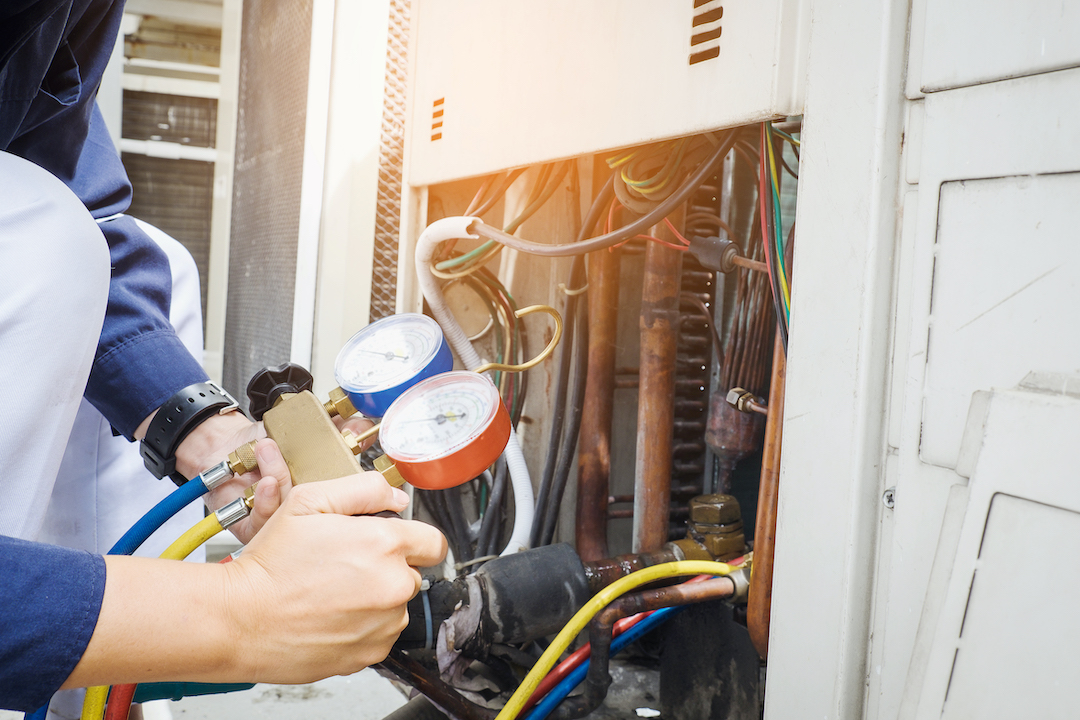Planning Ahead Before Your heat pump replacement ooltewah tn Starts
Picking In Between a Warm Pump and Furnace: Trick Factors To Consider for Your A/c Needs
When evaluating home heating alternatives for cooling and heating needs, the choice between a heatpump and a heating system can be complicated. Each system supplies unique advantages customized to particular environments and energy efficiency goals. Comprehending these differences is necessary for making an educated selection. Secret variables such as setup costs and environmental influence even more complicate the option process. Which option truly straightens with one's comfort and sustainability preferences? The adhering to sections will certainly check out these factors to consider in detail.
Understanding Warmth Pumps: Exactly How They Function and Their Benefits
While several homeowners take into consideration different home heating choices, recognizing exactly how heat pumps function and their benefits can substantially affect their choice. Heatpump operate by moving heat as opposed to creating it. In the wintertime, they remove heat from the outdoors air or ground and move it inside your home, while in the summer season, they reverse this procedure, cooling the home by getting rid of warmth outside. This double functionality makes them flexible for year-round climate control.One of the key advantages of warmth pumps is their power effectiveness. They utilize significantly much less power compared to conventional heating unit, possibly resulting in lower utility bills (furnace replacement). In addition, heat pumps have a smaller carbon footprint, making them an eco-friendly selection. They also need less upkeep than conventional systems, adding to long-term expense financial savings. On the whole, recognizing the auto mechanics and advantages of heatpump can assist home owners make educated decisions concerning their home heating and cooling down needs
Checking Out Furnaces: Kinds, Operation, and Advantages
Heaters are available in different types, including gas, electric, and oil versions, each with unique operational mechanisms. Comprehending these differences is necessary, as they influence effectiveness and heating performance. Furthermore, heating systems use various advantages, such as regular warm outcome and reliability in chillier climates.
Kinds of Heaters
Heater can differ considerably in design and procedure, with heating systems being a prominent choice among home owners. There are numerous sorts of furnaces, each making use of various fuel resources and modern technologies. Gas heaters prevail, leveraging gas to generate warm efficiently. Electric heaters, on the other hand, utilize electrical resistance to generate heat, often preferred for their straightforward installment. Oil heaters, while less typical, work in areas with restricted gas accessibility (furnace replacement). Furthermore, condensing heaters make best use of power effectiveness by recycling and recording exhaust gases. Each type operates via a system of warm exchangers and ductwork to disperse warm air throughout a home. Recognizing the distinctions in between these furnace kinds is crucial for notified cooling and heating decisions
Advantages of Furnaces
For property owners looking for reputable heat throughout cold months, the benefits of furnaces are significant. Furnaces supply constant home heating, making certain even temperatures throughout the home. They are especially effective in extreme chilly, often outshining heatpump in cold conditions. Numerous kinds, consisting of gas, electric, and oil furnaces, offer adaptability to satisfy diverse requirements and preferences.Furnaces also tend to have lower preliminary setup expenses compared to heatpump, making them a much more easily accessible choice for many. Their durable layout adds to a much longer life expectancy, with lots of devices lasting over 15 years with correct maintenance. Additionally, modern heating systems are commonly outfitted with sophisticated innovation for enhanced effectiveness, which can lead to decreased energy bills. Generally, heaters stay a trustworthy selection for effective home heating.

Power Efficiency: Contrasting Heat Pumps and Furnaces
When contrasting energy efficiency between warmth pumps and furnaces, the Seasonal Energy Performance Proportion (SEER) plays a vital duty in establishing efficiency. Additionally, a functional expense evaluation reveals the long-term economic implications of each system. Understanding these aspects can guide property owners in making notified choices concerning their home heating solutions.
Seasonal Energy Effectiveness Ratio
Energy efficiency plays an essential role in the decision-making process in between heatpump and heating systems, especially when thinking about the Seasonal Power Effectiveness Proportion (SEER) This statistics measures the cooling efficiency of heatpump over an entire air conditioning period, providing a standardized way to evaluate performance. Greater SEER ratings show better power efficiency, translating to reduced power consumption and lowered energy expenses. On the other hand, furnaces are usually evaluated using the Yearly Fuel Utilization Efficiency (AFUE) rating, which reflects home heating performance. When comparing these two systems, home owners need to focus on SEER scores for warm pumps, as they directly effect general power savings and ecological sustainability. A complete understanding of SEER can notably affect the lasting complete satisfaction and cost-effectiveness of the chosen heating and cooling solution.
Operational Price Evaluation
Understanding the functional prices connected with warmth pumps and furnaces is important for house owners evaluating their choices. Heat pumps normally provide higher energy performance, converting electrical energy right into heat with very little waste. This causes lower regular monthly utility expenses, particularly in modest environments. On the other hand, traditional heaters, specifically gas versions, might have lower ahead of time expenses yet can sustain greater functional expenses with time because of sustain prices and effectiveness ratings.Moreover, heatpump can work as both heating and cooling systems, possibly decreasing the demand for separate cooling and heating systems. While first investments for heatpump may be higher, their lasting savings in power effectiveness can make them a more economical option for several houses. Mindful evaluation of local power rates is necessary to identify the ideal choice.
Setup Costs: What to Anticipate for each and every Heating Unit
Installment costs for heating systems can vary considerably between heatpump and heating systems, affecting house owners' choices. Warm pumps normally have greater upfront installment expenses, generally ranging from $3,500 to $8,000, relying on the unit size and read this complexity of setup. This consists of the exterior device, interior handling system, and essential ductwork alterations. On the other hand, furnaces often tend to have reduced first costs, balancing in between $2,500 and $6,000, which can be appealing for budget-conscious homeowners. Installment costs can increase if extensive ductwork is required.Moreover, the selection of gas kind for heaters-- natural gas, lp, or electrical-- can also impact installation prices. While warm pumps use energy efficiency, their preliminary financial investment might prevent some purchasers. Inevitably, reviewing installment costs together with long-lasting savings helpful hints and performance will certainly help homeowners in making educated decisions concerning their furnace.
Climate Factors To Consider: Which System Executes Much Better in Your Location
Exactly how do climate problems affect the efficiency of heater? The performance of warmth pumps and furnaces can differ considerably relying on the local environment. In modest environments, heatpump succeed by effectively moving heat from the outside air, making them an energy-saving alternative. Their effectiveness lessens in very cold temperatures, where they might battle to extract adequate warmth. On the other hand, heaters, particularly gas designs, offer constant and trusted warm regardless of exterior problems, making them better in chillier regions.In locations that experience milder wintertimes, heatpump can operate effectively year-round, supplying both cooling and heating. On the other hand, areas with rough winter seasons frequently take advantage of the robustness of heaters. Ultimately, understanding the regional climate is vital when deciding in between a heatpump and a heater, as it straight influences their operational effectiveness and general efficiency.
Upkeep Requirements: Long-Term Take Care Of Heat Pumps vs. Furnaces
While both heatpump and heaters need regular upkeep to ensure peak efficiency, their certain demands and care routines differ significantly. Heaters usually require less regular interest, with yearly assessments being adequate to look for gas leakages, tidy filters, and analyze total performance. Their less complex design usually allows for uncomplicated repairs.In contrast, heatpump necessitate semiannual upkeep due to their double function in heating & cooling. This includes cleansing coils, inspecting cooling agent levels, and making certain that both the indoor and outdoor units work at their ideal. Additionally, heatpump upkeep often involves even more detailed elements, making expert servicing essential.Neglecting maintenance can result in reduced efficiency and boosted power prices for both systems. Ultimately, house owners ought to consider these lasting treatment demands when picking in between a warmth pump and a heater, as positive upkeep can extend the life expectancy and efficiency of either system considerably.
Ecological Effect: Picking a Sustainable Home Heating Option
The ecological effect of heating unit is a vital analysis for property owners seeking sustainable choices. Heatpump are normally much more energy-efficient than typical furnaces, as they move heat instead than generate it, significantly decreasing try this site carbon emissions. By utilizing sustainable power sources, such as geothermal or air-source heatpump, property owners can even more minimize their environmental footprint.On the other hand, gas furnaces send out greenhouse gases and add to air pollution, though they often give higher heat output. However, improvements in innovation have actually caused the growth of high-efficiency heaters that reduce emissions.Ultimately, choosing a heating system entails weighing efficiency versus environmental impact. Homeowners are motivated to assess regional power resources and incentives for eco-friendly systems, guaranteeing an option that aligns with both personal convenience and environmental obligation. The decision impacts not just immediate convenience however additionally lasting sustainability and ecological health.
Often Asked Inquiries
How Much Time Do Warm Pumps and Furnaces Generally Last?
The life-span of warmth pumps commonly ranges from 15 to two decades, while furnaces can last between 15 to three decades. Normal upkeep considerably affects their durability and performance in providing home heating solutions.
Can I Make Use Of a Heat Pump in Very Cold Climates?
Heat pumps can operate in extremely cool environments, however their performance reduces as temperatures drop. In such problems, supplemental heating resources may be essential to maintain comfy indoor temperatures and assure peak performance.

What Is the Sound Level of Heat Pumps Versus Furnaces?
The noise levels of heatpump and heating systems vary considerably. Usually, warm pumps operate even more quietly than conventional heating systems, making them better for those conscious sound, while heaters might generate louder functional sounds during heating cycles.
Are Warmth Pumps Suitable for Both Heating & Cooling?
Warm pumps are indeed ideal for both heating and cooling (heat pump service). They operate by transferring heat, providing effective temperature level control year-round, making them a flexible option for homeowners looking for an all-in-one heating and cooling service
What Dimension Heating System Do I Need for My Home?
Establishing the ideal dimension furnace for a home calls for reviewing aspects such as square footage, insulation quality, local climate, and the home's layout. Consulting a professional can assure an exact evaluation and perfect comfort. Warm pumps usually provide higher energy effectiveness, converting electrical energy right into heat with minimal waste. In modest environments, warm pumps excel by successfully transferring warm from the outdoors air, making them an energy-saving alternative. On the other hand, furnaces, especially gas designs, provide constant and trusted warm regardless of exterior conditions, making them more effective in cooler regions.In locations that experience milder winter seasons, warm pumps can operate successfully year-round, offering both heating and cooling. Warmth pumps are usually extra energy-efficient than traditional heating systems, as they transfer warm instead than create it, greatly decreasing carbon emissions. By utilizing renewable energy resources, such as air-source or geothermal warm pumps, house owners can even more minimize their environmental footprint.On the other hand, natural gas heating systems emit greenhouse gases and contribute to air contamination, though they commonly supply higher warm result.